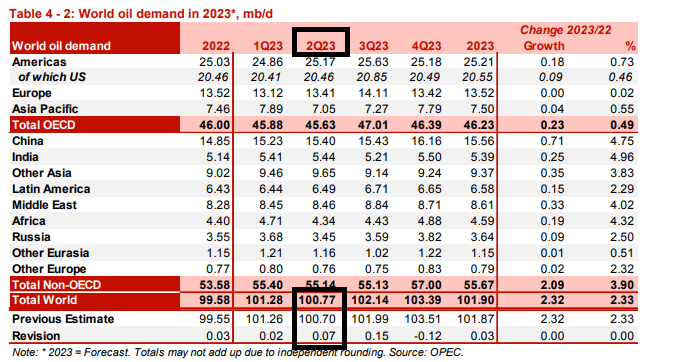WTI to Head Lower in Q2 as Fundamentals Weaken
OPEC Anticipates Lower (QoQ) Global Oil Demand in Q2
According to revised forecasts in OPEC’s monthly report for March, Q2 remains likely to see a drop in global oil demand compared to Q1, although the group now sees a slight improvement of an additional 70,000 barrels per day (bpd) compared to last month’s figures. In Q2, OPEC anticipates global oil demand of 100.77 million barrels per day (mbpd), down from the Q1 figure of 101.28 mbpd.
This article delves into the fundamental factors surrounding oil. For a full technical forecast, see our guide below
Recommended by Richard Snow
Find out what key technical levels are in store for oil Q2
OPEC World Oil Demand Forecast – March Update
Source: OPEC
The drop in global oil demand is less concerning when considering we are entering a period of seasonally lower usage as winter comes to an end and there is a sizeable gap before the start of the summer driving period.
Supply Outpaces Demand as Bearish Factors Accrue
Continuing with OPEC’s March monthly report, the cartel makes reference to the fact that it is pumping about 28.92 mbpd, which is around 300,000 bpd more than it anticipates will be required in Q2. Furthermore, the actual surplus could be even more if Russian production continues to show signs of resiliency despite heavy sanctions. Recent diplomatic discussions between Chinese President Xi Jingping and Russian President Vladimir Putin, have solidified relations between the two nations as China has been seen increasing its share of global oil purchases from Russia. OPEC’s output forecasts assume a large decline in output for Q2, opening the door to an even larger oversupply.
China Expected to do all the Heavy lifting to Boost Oil Demand Growth
World oil demand growth for 2022-2023 reveals a sizeable drop off in non-OECD, non China regions along with a decline in OECD Americas. Global oil demand growth would certainly have suffered if it were not for the reopening of the Chinese economy as the zero-covid policy came to an end in 2022. However, even with the massive increase in Chinese demand, overall demand growth lags behind that witnessed in 2022. Thus far, the effect of the Chinese reopening has done little to bring about higher oil prices even at a time when OPEC implemented a planned 2 mbpd cut in production with varied success. Despite this, OPEC estimates that global consumption will reach a record of 101.9 mbpd this year.

Source: OPEC Monthly Report (March)
Recommended by Richard Snow
Understanding the Core Fundamentals of Oil Trading
WTI ‘Pseudo Support’ at Risk on Recent SPR Admission
Energy Secretary Jennifer Granholm told US representatives at a congressional hearing that it could take years to refill the country’s Strategic Petroleum Reserves (SPR). The desired level to refill greatly diminished oil reserves was said to be between $67 and $72, or when prices were seen to be trading below $70 for an extended time. Therefore, this level has held up consistently whenever WTI prices dipped, as markets foresaw the possibility of mass buying from the US government. That has now been removed.
Despite persuading congress to cancel further sales of 140 million barrels between 2024 through to 2027, the Department of Energy is still due to sell 26 million barrels from the SPR to help with the federal budget.
The chart below showing the current level of reserves almost looks identical to levels we saw in last quarter’s update, confirming that such large-scale purchases to replenish diminished stocks are yet to take place
Weekly Chart of US Crude Oil Inventories in the SPR
Source: EIA




Comments are closed.